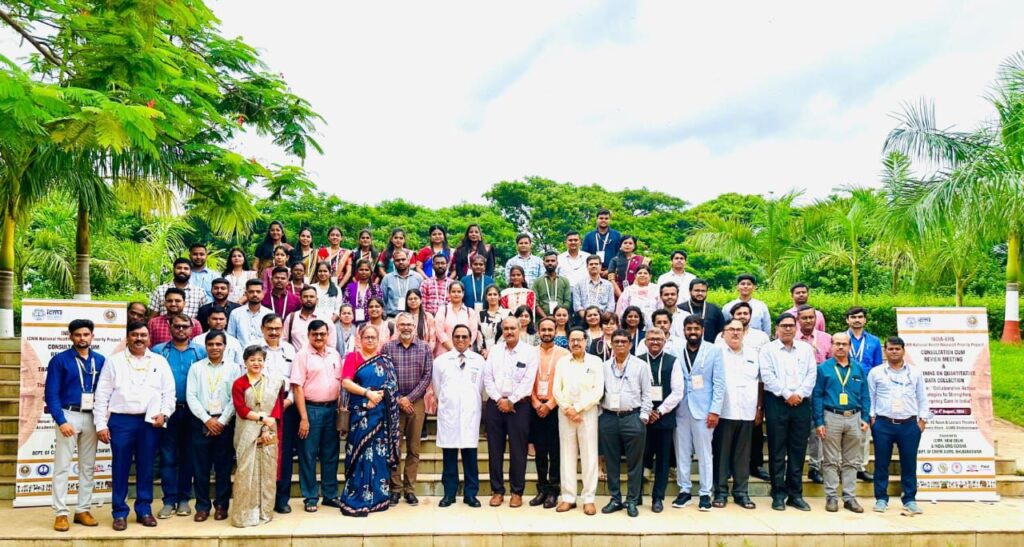High-Quality Patient-Centric Integrated Model for Emergency Care System to be developed in Puri
– AIIMS Bhubaneswar, ICMR, and State Govt. to Implement Project in Odisha
– ICMR to Implement National Priority Project in Five Districts of India
Bhubaneswar, 07/08/2024: The Indian Council of Medical Research (ICMR) has launched a National Health Research Priority Project aimed at developing advanced emergency care systems. This project, which includes the district of Puri in Odisha, seeks to establish a High-Quality Patient-Centric Integrated Model for Emergency Care Systems across five districts: Puri (Odisha), Ludhiana (Punjab), Vidisha (Madhya Pradesh), Vadodara (Gujarat), and Pondicherry, said AIIMS Bhubaneswar Executive Director Dr. Ashutosh Biswas.
The initiative will enhance emergency care by improving logistics, boosting healthcare provider competencies, integrating information technology and artificial intelligence tools, and mapping facilities. Key components of the project include improving ambulance services, increasing community demand, and training first-level responders. The project will address seven critical emergencies: heart attack, brain stroke, trauma, snake bite, poisoning, respiratory emergencies, and neonatal and maternal emergencies, added Dr. Biswas.
AIIMS Bhubaneswar, in collaboration with ICMR and the state government, is spearheading the project in Odisha. Dr. Ashutosh Biswas, Executive Director of AIIMS Bhubaneswar, emphasized the collaborative nature of the initiative during a National Level Consultation cum Review Meeting held at AIIMS Bhubaneswar. The meeting, themed “Collaborative Action: Strategies to Strengthen Emergency Care in India,” gathered key stakeholders to discuss strategies for enhancing emergency care.
A research team led by Dr. Arvind Kumar Singh, Additional Professor at AIIMS Bhubaneswar, has been formed to develop and implement this model in collaboration with the state government.

Prominent attendees included Dr. Meenakshi Sharma (ICMR, New Delhi), Dr. Vishwajeet Kumar (CEL, Lucknow), Dr. Jeyaraj D Pandian (CMC Ludhiana), Dr. Sitanshu Sekhar Kar (JIPMER, Puducherry), Dr. Prasanta R. Mohapatra, Dr. Sonu Hangma Subba, Dr. Bhagirathi Dwibedi, Dr. Binod Kumar Patro, Dr. Arvind Kumar Singh from AIIMS Bhubaneswar, Dr. Manu Ayyan (JIPMER, Puducherry), Dr. Hemant Kumar Patadia (Parul University), and Principal and Co-Principal Investigators from the five project sites. The Government of Odisha dignitaries included Dr. Bijay Kumar Mohapatra, Director Of Health Services, Dr. Nilakantha Mishra, Director of Public Health, Dr. Santosh Kumar Mishra, DMET, and Dr. Kaushik Mishra, Superintendent, SJMCH. State officials from other states joined online. Project team members from INDIA EMS and Regional Institute, AIIMS Bhubaneswar, also attended.
Dr. Ashutosh Biswas unveiled the Vision Document of INDIA EMS and Training Manuals, advocating for the integration of geo-tagging systems, IT, HR, and HMIS. He emphasized improvements in transport, ALS facility ambulances, immediate response, and community education on basic life support.
Dr. Bijay Kumar Mohapatra stressed the importance of enhancing the emergency healthcare system in Odisha, and Dr. Nilakantha Mishra highlighted the need to integrate the INDIA-EMS with national programs and scale it across all districts. Dr. Santosh Kumar Mishra addressed the gaps in ambulance care, calling for better paramedic engagement and training.
Dr. Meenakshi Sharma provided an overview of the INDIA-EMS project, highlighting the Hub & Spoke model and AI applications to tackle seven time-sensitive acute emergency conditions. Dr. Vishwajeet Kumar underscored the importance of implementation research in transforming emergency healthcare, proposing a bottom-up approach to understand barriers and health-seeking behavior.
This project represents a significant step towards revolutionizing emergency healthcare in India through collaboration, advanced technology, and comprehensive training.
